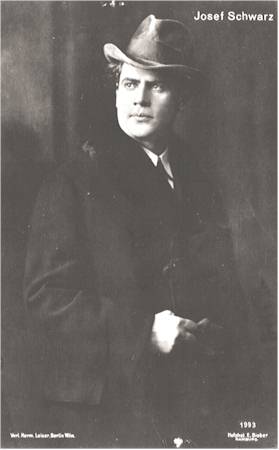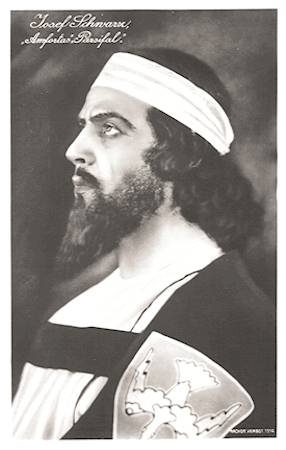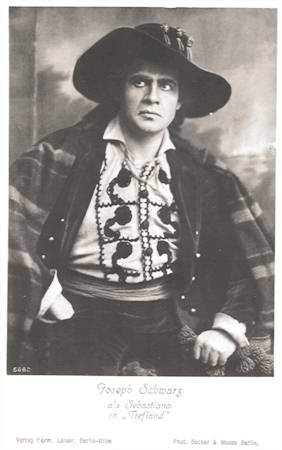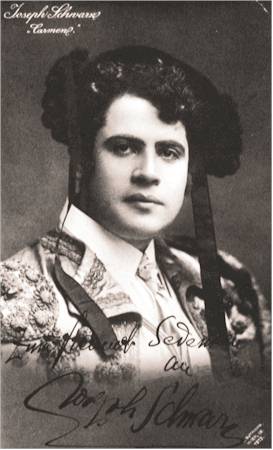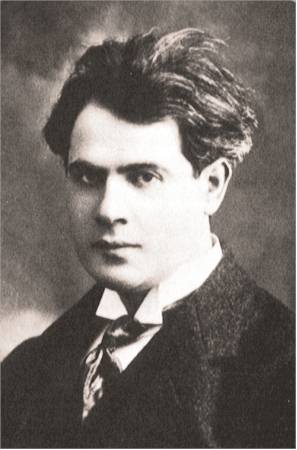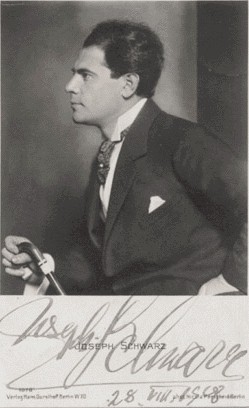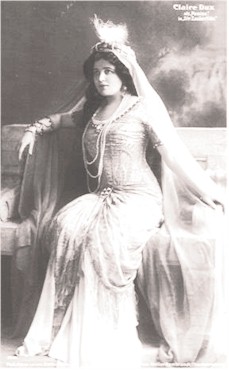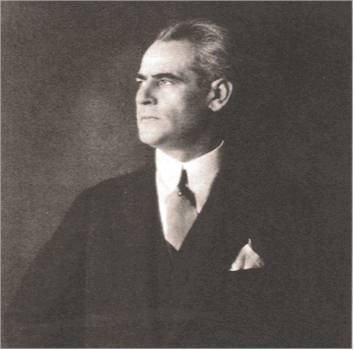Latvian-German baritone, 1880 - 1926
Biographical notes: He was born in Riga to Jewish parents who had to bring up ten children. He grew up in poverty
and became a young tailor but his vocal talent was soon discovered. He met a rich family who realized his potential and he was able to study singing with Adolf Robinson in Vienna. He made
his debut at Linz in 1900 as Amonasro. Subsequently he toured with enormous success and returned to his home town Riga at the Imperial Opera in St. Petersburg. He was invited at the
Vienna Volksoper and later he became member of the Imperial Vienna Opera where he remained an admired member of the ensemble from 1909 to 1915. After the sudden demise of the popular
Leopold Demuth he had to take over the latter’s roles. Very soon triumphant acclaim followed, especially when he partnered Enrico Caruso, who often made guest appearances in Vienna. His
repertory included roles such as Amfortas, Wanderer, Wolfram, Scarpia, Germont-père, Escamillo, Renato and Valentin. After a guest appearance in Berlin in 1915, the singer decided to
terminate his contract with the Vienna Opera and moved to Berlin where he was hailed as “second Battistini.” He soon became one of the most splendid and popular members of the ensemble. His
psychological study of Iago made theatre history in Berlin. In 1921 he toured the United States, and for several years he was associated with the Civic Opera Company in Chicago and was also
immediately engaged at the Met. His singing was enhanced by his superb stage presence. His histrionic ability caused his style to be compared to Chaliapin’s! By the time of 1925 his voice was
in decline. It was said that his addiction to alcohol and consequent failing health undermined his vocal technique. He died the following year of kidney desease.
As Amfortas
As Sebastiano in d’Albert’s “Tiefland”
Joseph Schwarz as Escamillo
Joseph Schwarz in young years Comment:
Joseph Schwarz ideally combined classical Italian “belcanto style” with emotional intensity, he belongs to the greatest baritones of the 20th century.
His is a gloriously vibrant, warm and dark-colored voice of outstanding quality. His legato and resonant mezza voce, his musical expression and flexibility are remarkable. I particularly like his
wonderful portamento singing. His vast repertoire included all baritone roles in German, Italian and French operas.
His frequent partner on stage and records - Claire Dux My favorite recordings: - All arias and duets, with Claire Dux (Title role in Rigoletto / Verdi / Gramophone 1916) - Hat dein heimatliches Land (Germont-père in La Traviata / Verdi / Gramophone 1916) - O du mein holder Abendstern (Wolfram in Tannhäuser / Wagner / Gramophone 1919) - Blick’ ich umher (Wolfram in Tannhäuser / Wagner / Gramophone 1919) - Vision fugitive (Hérode in Hérodiade / Massenet / Parlophon 1913)
- Für Dein Glück (Renato in Un Ballo in Maschera / Verdi / Gramophone 1916) - Ja, du warst’s (Renato in Un Ballo in Maschera / Verdi / Gramophone 1916) - Zazà, piccola zingara (Cascart in Zazà / Leoncavallo / Gramophone 1919) - O komm’ im Traum (Liszt / Gramophone 1916) - Kol nidre (Levandovski-Rosenfeld / Gramophone 1916) - Freundliche Vision (R. Strauss / Gramophone 1918)
Joseph Schwarz shortly before his untimely death (1926)
|
|||||||||||||||||||||
